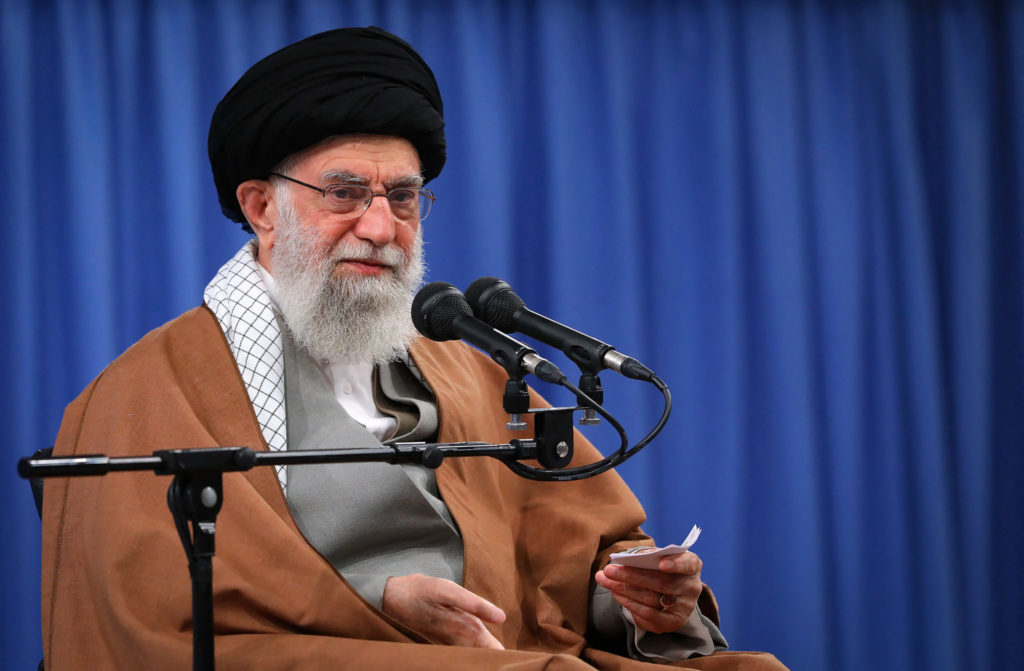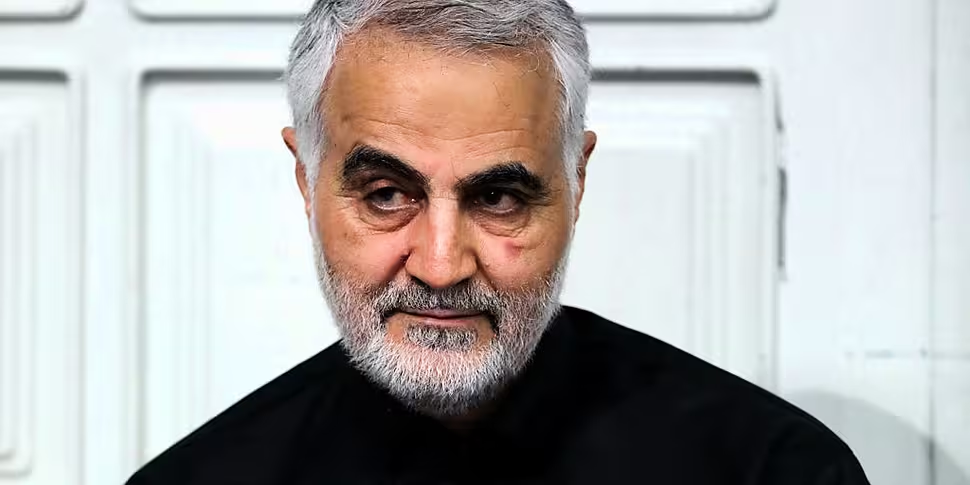The killing of a top Iranian general during a US airstrike on Baghdad Airport has been condemned by Iran as "an extremely dangerous and foolish escalation".
The Pentagon confirmed US forces killed General Qassem Soleimani, the head of Iran's elite Quds Force and spearhead of Iran's spreading military influence in the Middle East, in Iraq on Friday.
US President Donald Trump defended the assassination in a series of tweets on Friday morning US time.
He claimed: "General Qassem Soleimani has killed or badly wounded thousands of Americans over an extended period of time, and was plotting to kill many more...but got caught!
"He was directly and indirectly responsible for the death of millions of people, including the recent large number of PROTESTERS killed in Iran itself."
Speaking from Florida on Friday afternoon local time, President Trump claimed: "We took action last night to stop a war - we did not take action to start a war."
Abu Mahdi al Muhandis, the deputy commander of Iran-backed militias known as the Popular Mobilisation Forces (PMF) and an adviser to Gen Soleimani, was also killed during the strike.
The Pentagon said the strike was carried out "at the direction" of President Trump, who several hours after the attack tweeted an image of the American flag.
On Friday, US media also reported that the Pentagon confirmed it was deploying around 3,500 more troops to the Middle East amid the increasing tensions in the region.
UN Secretary-General General Antonio Guterres urged "maximum restraint" in the wake of the assassination of Soleimani.
A spokesperson said: "The Secretary-General has consistently advocated for de-escalation in the Gulf. He is deeply concerned with the recent escalation.
"This is a moment in which leaders must exercise maximum restraint. The world cannot afford another war in the Gulf."
"Crushing revenge"
Reacting to the killing of Soleimani, Iranian Foreign Minister Mohammad Javad Zarif said in a post on Twitter: "The US act of international terrorism, targeting & assassinating General Soleimani... is extremely dangerous & a foolish escalation. The US bears responsibility for all consequences of its rogue adventurism."
Iran's Defence Minister Amir Hatami has threatened the US with "crushing revenge" for the death.
Hatami, who is also top commander of the elite Quds, said: "A crushing revenge will be taken for Soleimani's unjust assassination... We will take revenge from all those involved and responsible for his assassination."
Iran's supreme leader Ayatollah Ali Khamenei also warned that a "harsh retaliation" is waiting for the US.
Declaring three days of public mourning during a statement on state television, Khamenei added: "All enemies should know that the jihad of resistance will continue with a doubled motivation, and a definite victory awaits the fighters in the holy war."
The Pentagon claimed General Soleimani had "orchestrated" attacks on coalition bases in Iraq over the past few months, and approved the "attacks" on the US embassy in Baghdad earlier this week.
Iranian President Hassan Rouhani said there was no doubt that Iran and "other freedom-seeking countries" in the region will take revenge.
He added: "Soleimani's martyrdom will make Iran more decisive to resist America's expansionism and to defend our Islamic values."
He tweeted that Iran will "take revenge for this heinous crime".
The flag of General Soleimani in defense of the country's territorial integrity and the fight against terrorism and extremism in the region will be raised, and the path of resistance to US excesses will continue. The great nation of Iran will take revenge for this heinous crime.
— Hassan Rouhani (@HassanRouhani) January 3, 2020
The US embassy in Baghdad has urged US citizens to depart Iraq immediately "via airline while possible, and failing that, to other countries via land".
تنبيه أمني - سفارة الولايات المتحدة في بغداد، العراق، 3 كانون الثاني 2020
Security Alert – U.S. Embassy Baghdad, Iraq, January 3, 2020https://t.co/3Cd1N4x6b9— U.S. Embassy Baghdad (@USEmbBaghdad) January 3, 2020
"This strike was aimed at deterring future Iranian attack plans," the Pentagon said in a statement, adding that the US would continue to take necessary action to protect Americans and interests around the world.
The rising tension between the US and Iran helped push the cost of Brent crude oil to US$68 (€60.93) per barrel - a rise of 3%.
The airstrike was conducted by a US drone, and according to a US official, General Soleimani's vehicle was struck on an access road near the airport.
A senior Iraqi security official said the strike took place near the cargo area after General Soleimani left his plane to be greeted by Mr al Muhandis. The plane had arrived from either Lebanon or Syria.
An Iranian politician said General Soleimani's body was identified by the ring he wore. An official from the PMF said they did not find the body of Mr al Muhandis.
It is unclear what legal authority the US relied on to carry out the attack.
 Iranian supreme leader Ayatollah Ali Khamenei addresses a group of Iranian nurses at a meeting, strongly condemning US air raids | Image: SalamPix/ABACA/ABACA/PA Images
Iranian supreme leader Ayatollah Ali Khamenei addresses a group of Iranian nurses at a meeting, strongly condemning US air raids | Image: SalamPix/ABACA/ABACA/PA ImagesUS reaction
US Secretary of State Mike Pompeo tweeted: "Iraqis - Iraqis - dancing in the street for freedom; thankful that General Soleimani is no more."
South Carolina senator Lindsey Graham, a Republican, posted: "To the Iranian government: if you want more, you will get more."
But former US Vice-President Joe Biden said the move was "a hugely escalatory move in an already dangerous region."
The candidate for the 2020 US presidential race said: "President Trump just tossed a stick of dynamite in a tinderbox, and he owes the American people an explanation of the strategy and plan to keep safe our troops and embassy personnel, our people and our interests, both here and abroad, and our partners throughout the region and beyond".
"We could be on the brink of a major conflict across the Middle East".
My statement on the killing of Qassem Soleimani. pic.twitter.com/4Q9tlLAYFB
— Joe Biden (@JoeBiden) January 3, 2020
Meanwhile, US Senator and presidential hopeful Bernie Sanders said "Trump's dangerous escalation brings us closer to another disastrous war in the Middle East that could cost countless lives and trillions more dollars".
He argued: "Trump promised to end endless wars, but this action puts us on the path to another one."
Tensions
American presidents claim broad authority to act without congressional approval when US personnel or interests are facing an imminent threat.
The attack comes amid tensions with the US after the New Year's Eve attack by Iran-backed militias on the US embassy in Baghdad.
The two-day embassy attack, which ended on Wednesday, prompted President Trump to order the deployment of around 750 US soldiers to the Middle East.
The breach at the embassy followed US airstrikes on Sunday that killed 25 fighters of the Iran-backed militia in Iraq, the Kataeb Hezbollah.
The US military said the Sunday strikes were in retaliation for last week's killing of an American contractor in a rocket attack on an Iraqi military base that the US blamed on the militia.
General Soleimani, who led the foreign arm of the Revolutionary Guards and had a key role in fighting in Syria and Iraq, acquired celebrity status at home and abroad.
He was instrumental in the spread of Iranian influence in the Middle East, which the US and Tehran's regional foes Saudi Arabia and Israel have struggled to keep in check.
He had survived several assassination attempts against him by western, Israeli and Arab agencies over the past two decades.
His Quds Force, tasked with carrying out operations beyond Iran's borders, shored up support for Syrian President Bashar al Assad when he looked close to defeat in the civil war and also helped militias defeat Islamic State in Iraq.









